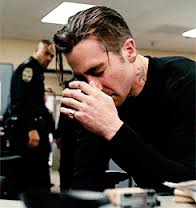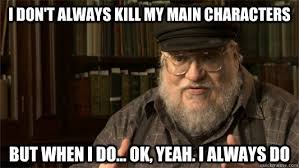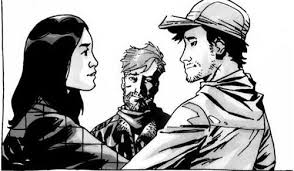|
I love characters dying in fiction. I hate it too though. I love the realism that in a dangerous situation, you don’t know who’s going to make it and who’s going to bite it. You hope it’s not your favourite characters, but if they weren’t a possible target then the drama wouldn’t be nearly as compelling. Although after catching up on both the comics and the TV show The Walking Dead, I started to notice something with Robert Kirkman’s decisions to kill certain characters. There were patterns in his kills. Of course, sometimes it was the stereotypical pattern. You know, the rookies claiming their desire to be the best or vets talking about how they want to spend their future once this is all over. Those characters are just begging to be the victim of some terrible fortune. And for the most part, Kirkman doesn’t rely on those tropes. But that doesn’t mean he doesn’t have a pattern for when he’s going to kill one or many of his characters. That’s when it hit me. Writers who kill their characters are serial killers. Well, not actual serial killers. I wasn’t try to imply that writers like Kirkman and George R.R. Martin are living out there dark seeded fantasies of killing people when they write Tyreese’s or Ned’s death. I mean, they may be, but I certainly don’t have that information and I’m not implying it either…please don’t hurt me Mr. Kirkman and Mr. Martin…I’ve seen what you’re capable of doing to people like me… Now joking aside, I do mean what I said. In a way, writers are serial killers. Some are messy and kill almost indiscriminately and others are precise and calculating, but all have a pattern they follow. At least, that’s what I’ve learnt from reading and watching years of crime, mystery, and horror fiction. Detectives and protagonists alike will search for the M.O. or modus operandi of a serial killer and in doing so it helps to discover who’s the killer. We don’t have to do that when enjoying fiction like The Walking Dead, though. We all know who’s doing the killing. It’s our favourite characters’ unsanctimonious creator, and I’m not talking about whatever god the character believes in; no, I’m talking about the writer. Alright, here’s my warning for all who wish to read the comics of The Walking Dead: SPOILERS AHEAD. I could probably discuss this topic without the use of spoilers but it’s difficult and I would start talking around my point a little too much. So here goes nothing. Glenn dies about two thirds of the way through the comic series where it is to date. I won’t give an exact number for the issue just in case, but it’s around that mark. Look it up, if you’re interested. Anyways, by far and away Glenn was my favourite character in the series. He was one of the longest lasting survivors from the original group Rick initially found. Whether it was on the road or shacked up in a farm, prison, town, or whatever other walled area, Glenn was a supply runner who got shit done. He was, from a reader’s perspective, the best at what he did. He was also a loyal Rick follower and a loving husband and adopted father. Near his end, he was essentially the last beacon of a paragon the series had to offer us without being a complete nut job. So, he had to die. Since Kirkman’s story is at least tangentially so popular because he keeps readers’ on their toes as to who might die next, he had to kill Glenn. He was too skilled a survivor and an all around likeable character for Kirkman not to kill him. And that’s the start of profiling Mr. Kirkman’s pattern of killing. Well before the publication of Glenn’s death, Kirkman knew that Glenn was going to die most likely due to how much readers adored him. He was a ripe target. After Kirkman locked in his target, he had to start preparing a death that would elicit a sizable emotional response from readers. So as the situations of the story unfold, we are shown certain sides of Glenn that may be familiar but are ultimately the steps that will lead to him being killed. In Glenn’s particular case, we see a range of steps. His wife is pregnant, he questions Rick’s capability to lead, and he becomes apologetic for his change in character. This is Kirkman’s pattern. He can’t kill a character doing the thing they’re really good at, especially someone like Glenn. So instead, characters from the main cast who are slotted to die are given a new outlook or chance for things in this terrible world to look brighter. As a result, they will most likely start to question Rick’s motives and leadership because they are afraid of losing what they were just given. However, everyone who rides with Rick knows that questioning Rick is a bad idea and so the character will become apologetic that he or she has had a change of heart or opinion. From what I can see, in one scenario or another, this is how Kirkman sets up his kills. I don’t remember ever single death that occurs in the main cast, but in sixty chapters I read last night, that was his definitive pattern. George R.R. Martin and other writers who kill their casts will most likely have their own unique patterns, but like I said they definitely have a pattern.
Saying that, I don’t think it’s necessarily a bad thing to have a pattern. From a writer’s perspective, our job is to elicit emotional responses and if you have a formula that works for that, you don’t want to fuck with it. However, if you’re aware of something you do, then you have a chance to change and manipulate it. Throwing in a curve into a well formulated pattern will keep readers guessing and uneasy about who might die next. For if writers are serial killers, then their audiences are detectives. So, writers of the world, keep your audiences guessing. Try to know your patterns better than they can, so your stories stay fresh and eliciting emotions right to the bitter end.
0 Comments
Leave a Reply. |
Archives
February 2016
Categories |







 RSS Feed
RSS Feed
